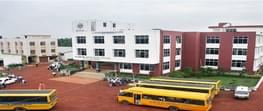Indian Institute of Engineering Science and Technology (IIEST), Shibpur is inviting applications for admission to its PhD Program offered in all disciplines of Engineering, Technology, Science, Architecture, Town & Regional Planning, Humanities & Social Sciences for the academic session 2023-24 (July Cycle).
Candidates who wish to apply for IIEST Shibpur PhD Admission 2023 can submit their online applications by May 29, 2023. The admission process is open for regular candidates with Institute fellowships, candidates with Individual fellowships (CSIR–NET JRF/ UGC–NET JRF/ ICMR/ DST INSPIRE etc), candidates from sponsored research projects and sponsored candidates.
IIEST Shibpur offers its PhD degrees in 17 different fields of research. Admission to the PhD course takes place in two cycles; one in July and the other in January. To be eligible for admissions, applicants need to have a master’s degree in the relevant field. Admission to the PhD programs is based on the performance of the candidates in the entrance test followed by an interview conducted by the Institute.
Table of Content
IIEST Shibpur PhD Eligibility Criteria
A Master’s degree in Engineering/ Technology/ Architecture/ Planning/ Science/ Humanities/ Management or in a related discipline from a recognized University/ Institute with a minimum of 60% marks from class 10 till the qualifying degree.
Note: A relaxation of 5% is given to students belonging to the SC/ ST/ DA categories.
IIEST Shibpur PhD Admission Guidelines
Candidates need to appear and qualify in an admission test conducted by the Institute. Such a competitive test may involve a written test and/ or interview. Eligible students for Institute Fellowship must possess a valid GATE/ NET score applicable for admission to doctoral programs in various discipline
- Visit the official site of IIEST Shibpur at iiests.ac.in.
- Hover your mouse on the admissions tab in the top right corner and select the PhD option from the drop-down menu.
- Register with your Email ID and log in with the new credentials.
- Fill up the online application form with appropriate data:
- The candidate has to write within a hundred words why they want to pursue a PhD in IIEST, Shibpur
- The candidate has to write a Statement of Problem (SOP) within five hundred words about their proposed research work.
- Upload your passport-sized photograph along with your signature.
- Pay the necessary application fee using the online payment gateway. The Application fee is INR1500 for OC/OBC(NCL)/EWS and INR 1000 for SC/ST/PwD candidates.
- Submit the application and take a printout for further use.
- The candidates will be further shortlisted and called for an interview if selected.
Read more: IIEST Shibpur Admission
IIEST Shibpur PhD. Course Details
IIEST Shibpur has sixteen departments, three schools, and two centres providing PhD with research specialization in various fields. The academic year is divided into two semesters and a summer term from May to mid-July.
The departments and the various research specializations are mentioned below:
| Department/ School/ Centre | Areas of Specialization |
|---|---|
| Aerospace Engineering and Applied Mechanics |
|
| Architecture, Town and Regional Planning |
|
| Chemistry |
|
| Civil Engineering |
|
| Computer Science and Technology |
|
| Earth Sciences |
|
| Electrical Engineering |
|
| Electronics and Telecommunications Engineering |
|
| Humanities and Social Science |
|
| Human Resource Management |
|
| Information Technology |
|
| Mathematics |
|
| Mechanical Engineering |
|
| Metallurgy and Materials Engineering |
|
| Mining Engineering |
|
| Physics |
|
| Centre for Healthcare, Science and Technology |
|
| Centre of Excellence in Green Energy and Sensor Systems |
|
| School of VLSI Technology |
|
| School of Community Science and Technology |
|
| School of Mecatronics and Robotics |
|
IIEST Shibpur PhD FAQs
Ques. Does IIEST Shibpur have hostel facilities for PhD students?
Ques. How are the faculties of IIEST Shibpur?
Ques. What is the total number of seats available for the PhD program?
Ques. What is the minimum CGPA required in examinations to continue with the PhD program at IIEST Shibpur?
Ques. What is the duration for which the PhD registration at IIEST Shibpur is valid?

![Indian Institute of Engineering Science and Technology - [IIEST] Shibpur](https://image-static.collegedunia.com/public/college_data/images/appImage/14858365115.jpg?h=240&w=1000&mode=crop)
![Indian Institute of Engineering Science and Technology - [IIEST] Shibpur](https://image-static.collegedunia.com/public/college_data/images/logos/1516868694iiestlogo.png?h=71.7&w=71.7&mode=stretch)








![Calcutta Institute of Technology - [CIT]](https://image-static.collegedunia.com/public/college_data/images/appImage/1622893062Screenshot20210605170716.png?h=111.44&w=263&mode=stretch)

![IIT Kharagpur - Indian Institute of Technology - [IITKGP]](https://image-static.collegedunia.com/public/college_data/images/appImage/1488973535e1.jpg?h=111.44&w=263&mode=stretch)

![National Institute of Technology - [NIT]](https://image-static.collegedunia.com/public/college_data/images/appImage/26009_NITD.jpg?h=111.44&w=263&mode=stretch)

![Indian Institute of Information Technology - [IIITK]](https://image-static.collegedunia.com/public/college_data/images/appImage/14857579134.jpg?h=111.44&w=263&mode=stretch)







![Rajiv Gandhi Institute of Petroleum Technology - [RGIPT]](https://image-static.collegedunia.com/public/college_data/images/logos/1515244621Logo.png?h=72&w=72&mode=stretch)
![The National Institute of Engineering - [NIE]](https://image-static.collegedunia.com/public/college_data/images/logos/col27917.jpg?h=72&w=72&mode=stretch)
![Sardar Patel Institute of Technology - [SPIT]](https://image-static.collegedunia.com/public/college_data/images/logos/16336900566237748820344441900178615267475362148777984n.png?h=72&w=72&mode=stretch)
![K. J. Somaiya College of Engineering - [KJSCE]](https://image-static.collegedunia.com/public/college_data/images/logos/1678082650SomaiyaUniversityLogo.png?h=72&w=72&mode=stretch)
![BMS College of Engineering - [BMSCE]](https://image-static.collegedunia.com/public/college_data/images/logos/1669187121Screenshot20221123123456.png?h=72&w=72&mode=stretch)
![Madan Mohan Malaviya University of Technology - [MMMUT]](https://image-static.collegedunia.com/public/college_data/images/logos/1498549801logo.png?h=72&w=72&mode=stretch)
![Indian Institute of Information Technology Design and Manufacturing - [IIITDM]](https://image-static.collegedunia.com/public/college_data/images/logos/1489583668logoedt.png?h=72&w=72&mode=stretch)
![Ramaiah Institute of Technology - [RIT]](https://image-static.collegedunia.com/public/college_data/images/logos/1544678802llogosramaiah01.jpg?h=72&w=72&mode=stretch)
![Army Institute of Technology - [AIT]](https://image-static.collegedunia.com/public/college_data/images/logos/1477054294AIT_Pune_logo.gif?h=72&w=72&mode=stretch)
![National Institute of Technology - [NIT]](https://image-static.collegedunia.com/public/college_data/images/logos/1496645029NITRaipurLogo.png?h=72&w=72&mode=stretch)
![National Institute of Technology - [NIT]](https://image-static.collegedunia.com/public/college_data/images/logos/col27821.png?h=72&w=72&mode=stretch)
![Jawaharlal Nehru Technological University - [JNTUH]](https://image-static.collegedunia.com/public/college_data/images/logos/1687173996JNTUH.jpg?h=72&w=72&mode=stretch)
![Indian Institute of Information Technology - [IIITK]](https://image-static.collegedunia.com/public/college_data/images/logos/14857579137.jpg?h=72&w=72&mode=stretch)
![National Institute of Technology - [NIT]](https://image-static.collegedunia.com/public/college_data/images/logos/15094366571394873627NationalInstituteofTechnologyNITGoa.png?h=72&w=72&mode=stretch)
![National Institute of Technology - [NIT]](https://image-static.collegedunia.com/public/college_data/images/logos/1508231363NITHlogo.png?h=72&w=72&mode=stretch)
![Punjab Engineering College University of Technology - [PEC]](https://image-static.collegedunia.com/public/college_data/images/logos/1509604893peclogo.png?h=72&w=72&mode=stretch)



Comments